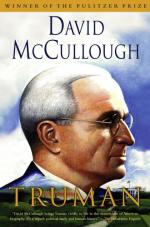
|
| Name: _________________________ | Period: ___________________ |
This test consists of 5 multiple choice questions, 5 short answer questions, and 10 short essay questions.
Multiple Choice Questions
1. What country's military is in possession of Potsdam at the time of the conference?
(a) Canada
(b) Germany
(c) Soviet Union
(d) Mexico
2. How many people did Oppenheimer estimate the bomb would kill?
(a) 200,000
(b) Two million
(c) None
(d) 20,000
3. When the U.S. and South Korean Army pushes the North Korean/Chinese back to the 38th parallel, what decision is made about the next step?
(a) To proceed into China
(b) To hold the line there
(c) To proceed into North Korea.
(d) To evacuate all troops from Korea
4. What was the Turnip Congress?
.
(a) The special congressional session called by Truman during the time of Missouri's Turnip Day
(b) A session of congress where only bills concerning turnips were discussed
(c) A special committee that turned up important information
(d) A session of congress where dissidents threw turnips at the congressmen
5. What longtime cabinet member resigns due to a disagreement with Truman?
(a) Harold Ickes
(b) Henry Wallace
(c) Robert E. Lee
(d) Andrew Jackson
Short Answer Questions
1. What happens to Margaret after her father finishes her Presidential terms?
2. What was a Dixiecrat?
3. Who was Truman's Vice President before Barkley?
4. Who was the leader of the Progressive Party who was in competition with the Democrats and Republicans in the 1948 election?
5. What was a whistle-stop?
Short Essay Questions
1. When Truman is on a state trip to Mexico, he visits the grave of the child heroes. Why did this act mean so much to the Mexican people?
2. Why was it so important for MacArthur and Truman to be in agreement on the military policy towards Korea and China?
3. The title for this chapter is "The Heat in the Kitchen." The author is referring to the intense pressures Truman experienced as he was also beginning his run for the presidency. List each of these pressures, and then describe how Truman dealt with them. When this report is done, write an essay outlining Truman's approach to dealing with issues, and whether or not you think his methods were appropriate.
4. Stalin is described as a personable, likable man; yet he ordered the murder of millions of people in his own country. Was there any indication in the activities of the Potsdam Conference that reveal this side of his character? Give examples.
5. Choose one of the following issues confronting Truman in this chapter: 1) Soviet acquisition of the atom bomb, 2) North Korea invading South Korea, 3) the Berlin Airlift, or 4) rise of Senator McCarthy. In your essay, outline how Truman and his administration handled the press regarding this issue. In your opinion, was the situation presented to the public in a good way?
6. Truman had corresponded with Churchill and Stalin, but had never met either of these leaders before Potsdam. Read through Chapter 10 again, noting Truman's observations of the two men. Pretending you are a reporter for an American newspaper, write an article describing the two men from Truman's view.
7. Read the coverage of the speech Truman gave on March 12, 1947, page 547 in the book. This became known as the Truman Doctrine. Why?
8. When the Trumans take an automobile trip across the nation, they are shocked at how many people recognize them and want to see them. Why?
9. When Robert Oppenheimer, the director of the Manhattan Project, comes to see Truman, the President is made uncomfortable about the visit. Why?
10. How did Truman react to political pressure regarding his bid for Presidency? Give specific examples.
|
This section contains 850 words (approx. 3 pages at 300 words per page) |

|




